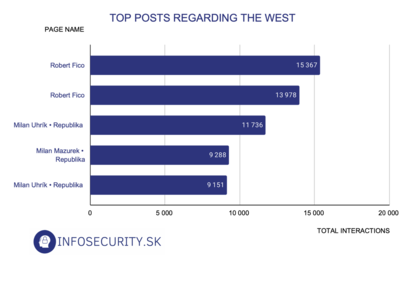DISINFORMATION
Disinformers condemn the support for Ukraine, national sovereignty of Slovakia becomes a point of debate

Infosecurity.sk presents an overview of disinformation trends that have been on the rise in information space in the past two weeks:
- With the news of the British government sending depleted uranium ammunition to Ukraine, many disinformation pages took to social media to condemn the decision and spread false claims about its effects.
- Opposition politicians are attacking the Slovak government for showing support to Ukraine.
- Anti-western narratives are still prevalent. Disinformers are especially utilising the widespread “Brussels dictate” narrative.
The British government sends depleted uranium ammunition to Ukraine and disinformation sites mobilise
With the ongoing war in Ukraine, anti-Ukrainian disinformation is still thriving on social media platforms. Apart from spreading false narratives, which are already strongly embedded in the Slovak information space, disinformers also adapt to current conditions and situations. Recently, the news about the British government supplying Ukrainian armed forces with depleted uranium ammunition sparked a wave of serious disinformation, with some actors claiming that the UK is sending dangerous nuclear material to Ukraine.
Disinformation page Veci Verejné (“Public Affairs”) wrote that depleted uranium is highly defective and if Ukrainian forces use it, many European countries could face cancer and birth defects. Another dubious page Armádny magazín (“Army Magazine”) claims that the use of British uranium munition could infest Ukraine “for centuries”. The second article cites Commander-in-Chief of the Radiation, Chemical and Biological Defence Forces of the Russian Federation Igor Kirillov as the primary source.
A well-known pro-Russian page Armáda Ruskej Federácie (“Army of the Russian Federation”) stated the following: “UK to send depleted uranium to Ukraine, Russia to send enriched uranium to the UK but in a different form. That's a pretty fair deal”. Even though they are trying to use vague wording, they clearly insinuate that Russia should use nuclear weapons against the UK in retaliation, which is highly dangerous rhetoric.
The aforementioned claims about the supposed negative health effects have since been debunked by the Ministry of Defense of Slovakia. The radioactivity of such materials is said to be extremely low - a claim that is backed by a study conducted by the International Atomic Energy Agency. Additionally, the use of depleted uranium ammunition is not prohibited by any conventions.
This ammunition is a standard part of the delivery package of British Challenger 2 tanks to Ukraine, for which the uranium-based ammunition is intended. Such missiles were developed by the US during the Cold War to destroy Soviet tanks, including T-72 tanks. Ukraine now faces these as it seeks to break the stalemate in the east.
Visit to Ukraine sparks a wave of political manipulation
Since the beginning of the war in Ukraine, many pro-Russian Slovak politicians, especially from the opposition parties, are actively trying to undermine the public’s support for Ukraine. Apart from many widespread anti-Ukrainian narratives, one of the main tools for this manipulation seems to be direct attacks against the incumbent politicians who show consistent support for Ukraine. The primary targets of this hostility are Slovak President Zuzana Čaputová, interim Prime Minister Eduard Heger and interim Minister of Defense Jaroslav Naď.
Heger and Naď have specifically faced personal attacks from various disinformation sources for their strong support of Ukraine during the whole duration of the war. However, this sentiment has become notably amplified in the last few weeks due to their decision to supply Ukraine with MiG-29 fighter jets, and now, for visiting Ukrainian President Volodymyr Zelensky in Kyiv.
The most popular post regarding the recent visit was published by Anna Belousovová, a former member of the Slovak parliament known for producing pro-Russian content. In this post, she suggests that by supporting Ukraine, Slovakia is becoming a part of the conflict and that Naď might eventually “offer” Slovak soldiers to fight on the Ukrainian side. This is a prime example of fear-mongering, a tactic of arousing fear in the general public, which in this case is aimed to undermine the public support for the government. It has been widely used with regard to narratives about martial law and the spillover of the conflict.
Ľuboš Blaha, an opposition MP for the SMER-SD party, stated the following: “Heger and Nad go to Kyiv for a treat. They and Volodymyr will have a great time about how they are dragging Slovakia into the war. But they don't care.” He references the MiG-29 fighter jets delivery and accuses both politicians of warmongering, a tactic widely used by opposition MPs in the last few months. By this, disinformers generally try to induce fear in the public and turn the citizens against the incumbent government as a way to boost their political preferences during the pre-election period.
Milan Uhrík, an MEP and a chairman of the far-right Republika party, commented on the situation in a similar manner. A post published on his Facebook page reads: “So Heger and Naď are in Ukraine. Honestly - they might as well stay there. They have nothing to do with Slovakia anyway”. Uhrík is trying to create an impression that by showing support for Ukraine, the two politicians are not serving Slovakia anymore and are virtually forgetting about their own citizens, which is highly misleading.
The West is destroying our values, disinformers claim
Similar to disinformation targeting Ukraine, anti-western narratives are not a new occurrence in Slovak information space. The range of topics addressed by disinformation actors is wide, but we can still observe one main narrative that is being spread - western organisations such as the European Union are supposed to dictate Slovakia what to do, thus robbing it of its sovereignty.
Milan Uhrík posted a video from the European Parliament in which Mikuláš Peksa, a Czech MEP, criticises Hungary for virtually prohibiting mentions of homosexuality in schools and says that this censorship assists in spreading homophobic sentiment in the society. Uhrík turns the argument on its head and says that he condemns more “compulsory homosexual education for children”, even though the discussion was about sex education as a whole. He adds “I strongly oppose the pushing of so-called progressive European values into our lives!”, which falls into hateful rhetoric widely used by far-right parties in Slovakia. These actors then simultaneously present themselves as defenders of traditional values in opposition to the "decadence of the West", which they hyperbolize with similar rhetoric.
This narrative of the EU “pushing” progressive values onto Slovak citizens is also being spread by other Republika members. Milan Mazurek claims that the European Union is “attacking marriage and family” with regard to discussions about same-sex marriage, and continues by saying that the EU “bans cars, restricts freedom, destroys industry and the economy, forces illegal immigrants into the country and attacks our values or beliefs”. He purposefully exaggerates each of the points to create a false impression that the EU, despite being composed of sovereign states, dictates Slovakia what to do. However, the proposed legislation, which was the main subject of the post, does not interfere in the internal affairs of states and does not violate the principle of subsidiarity as the MEP tried to convince his audience.
Since posts with anti-western sentiment, specifically targeting the European Union, were highly prevalent in Slovak information space in the past two weeks, we also looked at them through an optic of a list of disinformation actors in Slovakia. We used the CrowdTangle analysis tool to analyse the most popular posts on Slovak Facebook that include the keywords “EU“, “Brussels“ or “The West”. Posts were evaluated based on the total number of interactions (the sum of all reactions, comments, and shares).

The first two places belong to Robert Fico, the chairman of the anti-system SMER-SD party and former prime minister. The first post is a photo of his meeting with the former Czech President Václav Klaus where the caption reads: “To make the word PEACE a forbidden term that is supposedly a sign of cheering for one side of the conflict is a joke gone wrong. We reject this on principle because SOVEREIGNTY of opinion, both national and political, is what makes us unique in the world.” He mentions the ongoing war and dangerously claims that standing on the side of Ukraine is reserved for “Western” politicians, not the Slovak government. He also states that supporting the country is in contradiction with national sovereignty, by which he completely distorts the reality of the conflict.
In his other post, which is clearly a part of his pre-election campaign, Fico says: “YES, I AM AN EXTREMIST WHEN IT COMES TO SLOVAKIA, OUR VALUES AND THEIR PROMOTION AT HOME AND ABROAD!... SMER - SD has chosen a sovereign left-wing path, filled with traditional values, which will not bend over backwards for Brussels, Washington or Moscow.” By this, he tries to appeal to the general public and create an image of a party independent from any external influence. Furthermore, the claim of “not bending over backwards for Moscow” is highly questionable since he and his party members can be considered some of the prominent sources producing and distributing pro-Russian content in Slovakia.
The third place belongs to Milan Uhrík, who expresses his support for China's Peace Plan for Ukraine. One of the points of the plan, he writes, is “abandoning the Cold War mentality and stopping the expansion of military blocs at the expense of the security of other countries”. This is a clear insinuation that the expansion of NATO somehow threatens Russia’s security, which is a claim that has been debunked numerous times.
The fourth place belongs to the aforementioned post from Milan Mazurek about the discussed EU legislation, where he purposefully misinforms about the proposal and organisation as a whole.
Milan Uhrík also posted a post praising China, which reads: “Instead of self-reflection and a return to common sense, Western leaders are looking elsewhere for blame. Soon the whole world will be "bad" for them, except of course their "holy" EU and America... But it doesn't work that way. The world is bigger.” This rhetoric addressing China aims to mask the indefensibility of Russia's actions. In other words, it still fulfils the key parameter that these actors aim to operate with, which is anti-Western sentiment.
Project Infosecurity.sk organized by Adapt Institute, which is supported by the Prague office of the Friedrich Naumann Foundation for Freedom, continuously monitors the activities of both Slovak and foreign disinformation actors, but focuses mainly on the former. The project activities are built upon daily monitoring of emerging disinformation, hoaxes, and conspiracy theories in the online information space. This approach allows the analysts to identify disinformation posts and narratives that resonated with the public the most, as well as to find out where they originated, and how they spread and evolved on social media. The report takes the form of a bi-weekly summary of arising trends in the spread of malicious information content online. Based on that, Infosecurity.sk can warn the public about emerging and current trends in the field of disinformation, manipulation, and propaganda.

